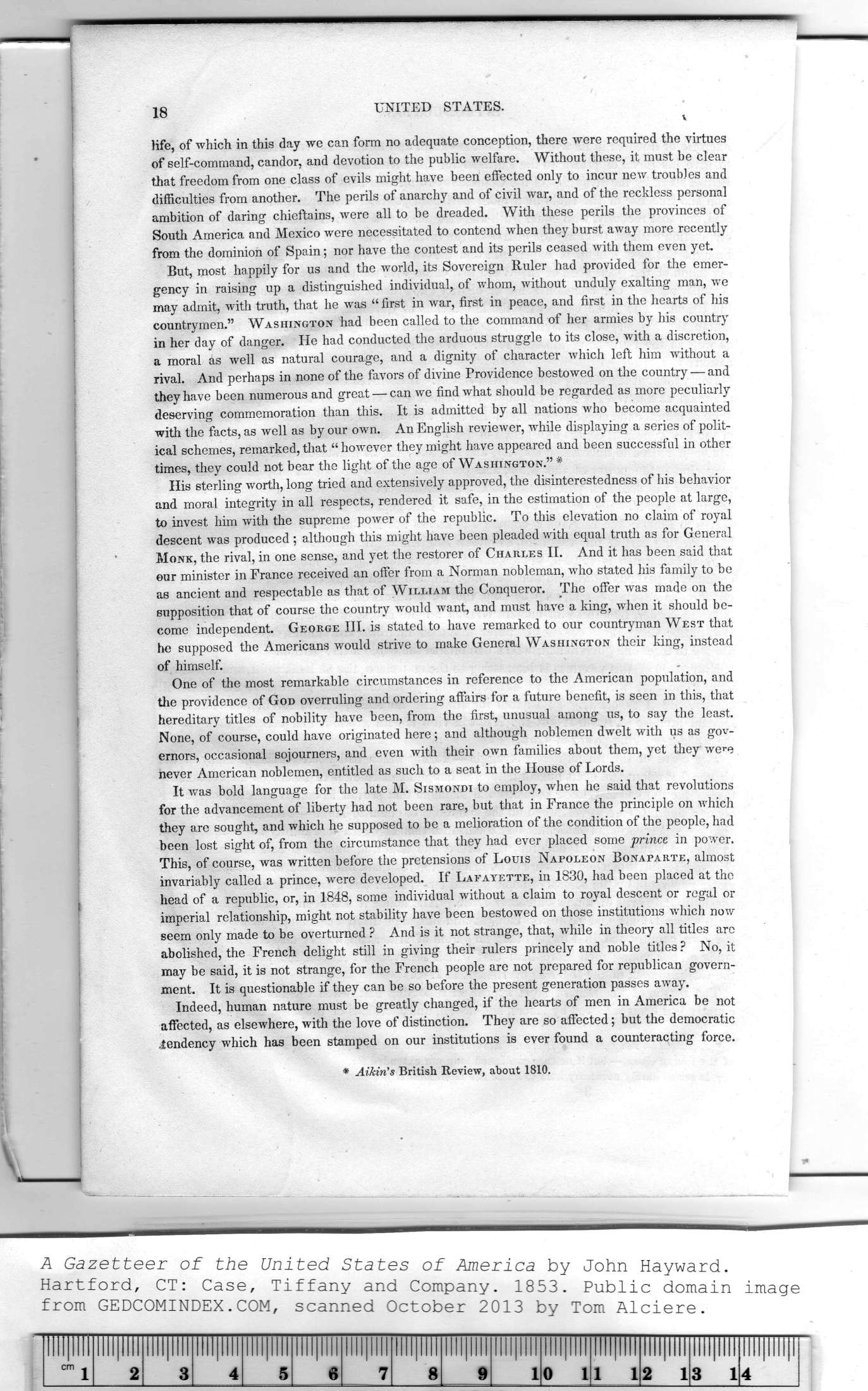|
|
Note: Ctrl and + increases the font size of the text below, Ctrl and - decreases it, and Ctrl and 0 resets it to default size.
v
18 UNITED STATES.
life, of which in this day we can form no adequate conception, there were required the virtues
of self-command, candor, and devotion to the public welfare. Without these, it must be clear
that freedom from one class of evils might have been effected only to incur new troubles and
difficulties from another. The perils of anarchy and of civil war, and of the reckless personal
ambition of daring chieftains, were all to be dreaded. With these perils the provinces of
South America and Mexico were necessitated to contend when they burst away more recently
from the dominion of Spain; nor have the contest and its perils ceased with them even yet.
But, most happily for us and the world, its Sovereign Ruler had provided for the emer-
gency in raising up a distinguished individual, of whom, without unduly exalting man, we
may admit, with truth, that he was “ first in war, first in peace, and first in the hearts of his
countrymen." Washington had been called to the command of her armies by his country
in her day of danger. He had conducted the arduous struggle to its close, with a discretion,
a moral as well as natural courage, and a dignity of character which left him without a
rival. And perhaps in none of the favors of divine Providence bestowed on the country — and
they have been numerous and great — can we find what should be regarded as more peculiarly
deserving commemoration than this. It is admitted by all nations who become acquainted
with the facts, as well as by our own. An English reviewer, while displaying a series of polit-
ical schemes, remarked, that “however they might have appeared and been successful in other
times, they could not bear the light of the age of Washington." #
His sterling worth, long tried and extensively approved, the disinterestedness of his behavior
and moral integrity in all respects, rendered it safe, in the estimation of the people at large,
to invest him with the supreme power of the republic. To this elevation no claim of royal
descent was produced ; although this might have been pleaded with equal truth as for General
Monk, the rival, in one sense, and yet the restorer of Charles II. And it has been said that
eur minister in France received an offer from a Norman nobleman, who stated his family to be
as ancient and respectable as that of William the Conqueror. The offer was made on the
supposition that of course the country would want, and must have a king, when it should be-
come independent. George III. is stated to have remarked to our countryman West that
he supposed the Americans would strive to make General Washington their king, instead
of himself.
One of the most remarkable circumstances in reference to the American population, and
the providence of God overruling and ordering affairs for a future benefit, is seen in this, that
hereditary titles of nobility have been, from the first, unusual among us, to say the least.
None, of course, could have originated here; and although noblemen dwelt with us as gov-
ernors, occasional sojourners, and even with their own families about them, yet they were
never American noblemen, entitled as such to a seat in the House of Lords.
It was bold language for the late M. Sismondi to employ, when he said that revolutions
for the advancement of liberty had not been rare, but that in France the principle on which
they are sought, and which he supposed to be a melioration of the condition of the people, had
been lost sight of, from the circumstance that they had ever placed some prince in power.
This, of course, was written before the pretensions of Louis Napoleon Bonaparte, almost
invariably called a prince, were developed. If Lafayette, in 1830, had been placed at the
head of a republic, or, in 1848, some individual without a claim to royal descent or regal or
imperial relationship, might not stability have been bestowed on those institutions which now
seem only made to be overturned ? And is it not strange, that, while in theory all titles are
abolished, the French delight still in giving their rulers princely and noble titles ? No, it
may be said, it is not strange, for the French people are not prepared for republican govern-
ment. It is questionable if they can be so before the present generation passes away.
Indeed, human nature must be greatly changed, if the hearts of men in America be not
affected, as elsewhere, with the love of distinction. They are so affected; but the democratic
.tendency which has been stamped on our institutions is ever found a counteracting force.
* Aikin's British Review, about 1810.
|
Illllllll |
Illllllll |
Illllllll |
Illllllll |
Illllllll |
llll|llll |
llll|llll |
Illllllll |
Illllllll |
Illllllll |
Illllllll |
Illllllll |
Illllllll |
Illllllll |
ll!!|llll|l |
|
CHI |
2 |
3 |
4 |
5 |
6 |
7 |
8 |
9 |
1 |
0 1 |
1 1 |
2 1 |
3 1 |
4 |
|
